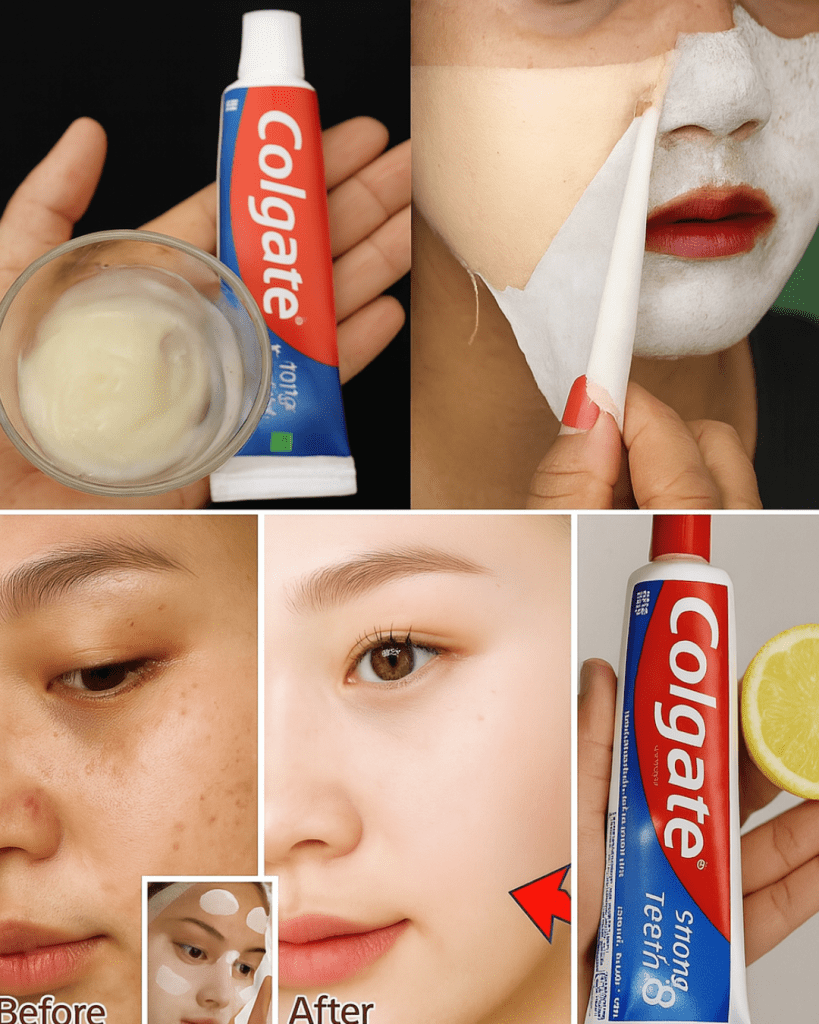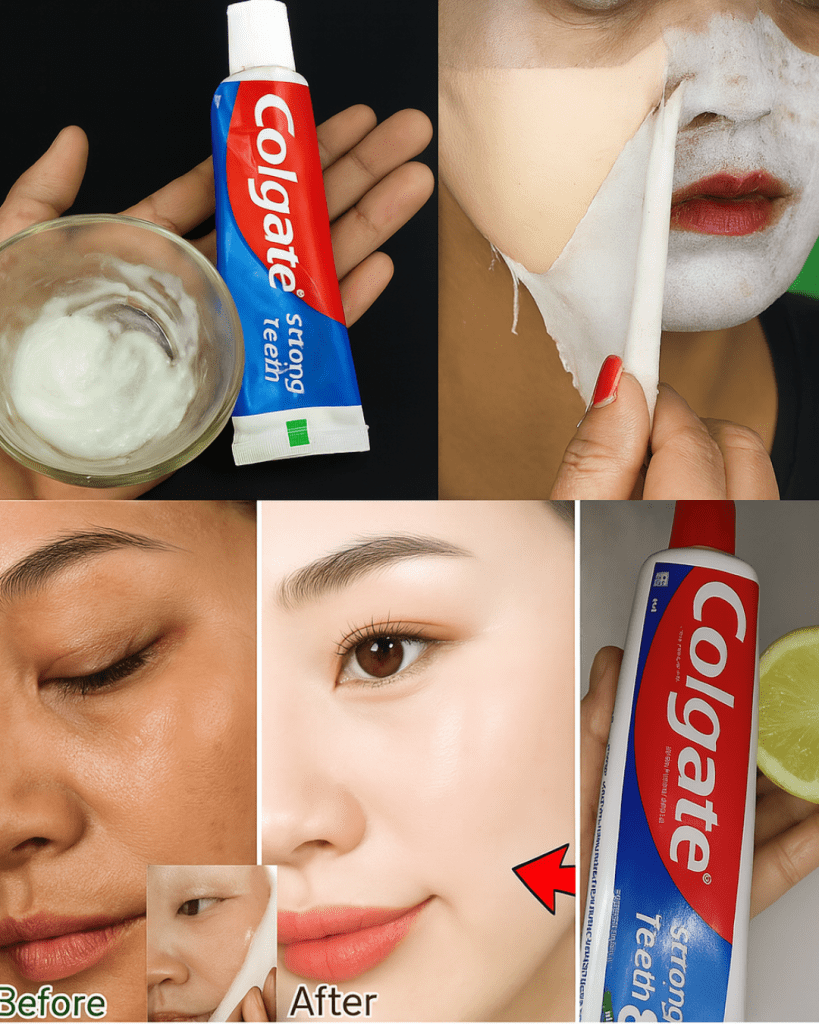Picture this: you’re scrolling through social media, and a viral beauty hack catches your eye. It promises glowing, even-toned skin using just two everyday items—Colgate toothpaste and lemon juice. Sounds like a dream, right? Cheap, accessible, and backed by countless glowing reviews claiming it zaps acne, fades dark spots, and leaves your face radiant. But before you rush to mix up this DIY face mask, there’s a catch: what sounds too good to be true often is.
This trendy combo has taken the internet by storm, but is it the secret to flawless skin or a recipe for disaster? Let’s dive deep into the science, risks, and real effects of using Colgate toothpaste and lemon juice for face whitening. By the end, you’ll know whether this hack is worth trying or better left in the realm of internet myths. Buckle up—this is going to be an eye-opener.

🧴 Why Colgate and Lemon? The Hype Explained
The buzz around this DIY face-whitening trick stems from the ingredients in Colgate toothpaste and lemon juice, which seem like a match made in skincare heaven. Colgate, especially the classic white paste, contains compounds that sound promising for skin:
Baking soda, a mild exfoliant that scrubs away dead skin and oil.
Hydrogen peroxide, a bleaching agent that might lighten dark spots.
Menthol, which delivers a cooling sensation and a “clean” feel.
Lemon juice, on the other hand, is packed with vitamin C and citric acid, both celebrated for brightening skin and reducing pigmentation. Together, they’re marketed as a powerhouse duo that can unclog pores, banish acne, and give your face an instant glow. Social media is flooded with before-and-after photos, with users raving about smoother, brighter skin after just one use.
But here’s the reality check: just because something works in your mouth doesn’t mean it belongs on your face. Let’s break down what this combo actually does—and why dermatologists are sounding the alarm.
✨ The Promised Benefits: What’s the Appeal?
The Colgate and lemon face mask has gained a cult following for its supposed skin-transforming effects. Here’s what fans claim it can do:
Brightens dark spots and pigmentation, giving an even-toned complexion.
Fights acne-causing bacteria, reducing breakouts and redness.
Exfoliates dead skin and clears clogged pores for a smoother texture.
Delivers an instant glow, making your skin look fresh and radiant.
These effects can be noticeable right after rinsing off the mask, which is why the hack feels like magic. The exfoliating action of baking soda and the astringent properties of lemon juice can temporarily tighten skin and reduce oiliness, creating a brighter appearance. But “temporary” is the key word here—these results don’t last, and they come with serious risks.
🧪 How to Make the DIY Colgate and Lemon Mask
If you’re curious enough to try this hack (with caution), here’s how it’s typically done. Follow these steps precisely to minimize potential harm:
Ingredients:
1 teaspoon Colgate toothpaste (white, non-gel formula)
½ teaspoon fresh lemon juice
Optional: A pinch of turmeric for anti-inflammatory benefits
Instructions:
Mix the toothpaste and lemon juice in a clean bowl until smooth.
Apply a thin layer to clean, dry skin, targeting dark spots or acne-prone areas.
Leave it on for 5–10 minutes—no longer, to avoid irritation.
Rinse thoroughly with lukewarm water to remove all residue.
Moisturize immediately to combat dryness and protect your skin barrier.
Pro Tip: Always do a patch test first. Apply a small amount to your wrist or jawline and wait 24 hours to check for redness, itching, or burning. Limit use to once a week at most.
⚠️ The Hidden Dangers: Why Experts Say No
While the Colgate and lemon mask might seem like a harmless kitchen experiment, dermatologists warn that it’s a risky gamble for your skin. Here’s why this viral hack could do more harm than good.
🔥 Irritation and Damage to Your Skin Barrier
Toothpaste is formulated for your teeth, not your face. Its alkaline pH (often around 8–9) clashes with your skin’s natural acidic pH (around 4.5–5.5). This mismatch can disrupt your skin’s moisture barrier, leading to:
Redness, burning, or stinging sensations.
Dryness, peeling, or flaking that worsens with repeated use.
Allergic contact dermatitis, a rash caused by harsh ingredients like sodium lauryl sulfate or fluoride.
Dr. Iram Qazi, a dermatologist, explains, “Toothpaste contains strong components that can cause irritation and burning when applied to the skin.” This isn’t just discomfort—it can compromise your skin’s ability to protect itself, making it more prone to infections or sensitivity.
☀️ Lemon Juice: A Photosensitivity Nightmare
Lemon juice might sound natural and safe, but its high acidity (pH around 2) and citric acid content can wreak havoc. When exposed to sunlight, lemon juice can cause phytophotodermatitis, a condition that leads to burns, blisters, or dark patches. These marks can last for months or become permanent.
Dr. Kohli, a skincare expert, cautions, “Applying lemon juice directly to the face can change the skin’s pH, making it more vulnerable to reactions when exposed to sunlight.” If you use this mask and step outside without thorough rinsing and sunscreen, you could end up with worse pigmentation than you started with.
🛑 No Proven Whitening Effect
Despite the hype, there’s no scientific evidence that Colgate toothpaste or lemon juice can effectively whiten skin. Toothpaste’s hydrogen peroxide is too low in concentration to lighten pigmentation, and lemon’s vitamin C is too unstable and dilute to penetrate deeply. Claims of “whitening” are often due to temporary exfoliation or irritation that makes skin appear brighter before it rebounds with redness or darkening.
Dr. Jyoti Agarkar, a dermatologist, emphasizes, “Toothpaste is not appropriate for skin application. Its strong components can cause more harm than good.” Instead of relying on unproven hacks, she advocates for skincare products designed for safe, effective brightening.
🚨 Who Should Avoid This Hack?
This DIY mask is especially risky for certain skin types and conditions. Steer clear if you have:
Sensitive or dry skin, which is easily irritated by harsh ingredients.
Eczema, rosacea, or other inflammatory skin conditions.
Open wounds, cuts, or active acne, as the mask can sting and worsen inflammation.
A history of allergic reactions to skincare or oral care products.
Pregnant women should also avoid this hack, as hormonal skin is more prone to sensitivity and pigmentation changes. When in doubt, consult a dermatologist before experimenting.
💡 Safer Alternatives for Brighter Skin
If your goal is to fade dark spots, reduce acne, or achieve a radiant complexion, there are better, safer options than the Colgate and lemon mask. Here are dermatologist-approved alternatives:
Vitamin C Serums: Look for stable, high-potency serums with 10–20% L-ascorbic acid to brighten skin and fade pigmentation without irritation.
Niacinamide Products: This gentle ingredient reduces dark spots, controls oil, and strengthens the skin barrier.
Chemical Exfoliants: Products with glycolic or lactic acid slough off dead skin for a smoother, brighter complexion.
Sunscreen: Daily SPF 30+ is non-negotiable to prevent pigmentation and protect against UV damage.
Professional Treatments: Consult a dermatologist for chemical peels, laser therapy, or prescription retinoids for stubborn pigmentation.
These options are backed by science and formulated to work with your skin, not against it. Investing in proper skincare will save you from the potential fallout of DIY hacks.
🩺 What to Do If You’ve Tried It
If you’ve already used the Colgate and lemon mask and are experiencing issues like redness, burning, or peeling, take action immediately:
Stop using the mask and avoid other harsh products.
Rinse your face thoroughly with lukewarm water and a gentle cleanser.
Apply a soothing moisturizer with ingredients like aloe vera or ceramides to repair your skin barrier.
Use a broad-spectrum SPF 30+ daily to prevent further damage.
See a dermatologist if symptoms persist or worsen, as you may need treatment for irritation or pigmentation.

🌍 Why This Trend Persists
The Colgate and lemon hack thrives because it’s cheap, accessible, and promises instant results. In a world where skincare can be expensive, DIY remedies feel empowering. But as dermatologist Dr. Prystowsky warns, “Toothpaste was never designed to be used on the face. There’s nothing therapeutic about it for the skin.” Social media may amplify the hype, but it often overlooks the risks.
Posts on X echo this caution, with users like @selangelic warning, “Don’t put toothpaste or lemon juice on your face,” and @thetiarawillis noting that such remedies can lead to irreversible hyperpigmentation or dermatitis. These voices remind us to prioritize skin health over fleeting trends.
✨ Final Thoughts: Glow Smart, Not Risky
The Colgate toothpaste and lemon juice face-whitening hack might tempt you with its simplicity and low cost, but the risks far outweigh the temporary glow. Irritation, photosensitivity, and potential long-term damage make this a trend to approach with extreme caution—if at all. Your skin deserves better than a gamble with products meant for your teeth.
Instead, embrace science-backed skincare that delivers real, lasting results. Consult a dermatologist to create a routine tailored to your skin type and goals. A brighter, healthier complexion is within reach—you just don’t need a toothbrush to get there.









